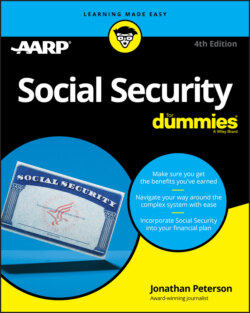Читать книгу Social Security For Dummies - Peterson Jonathan, Jonathan Peterson - Страница 65
Recognizing the Potential Payoff of Working Later in Life
ОглавлениеSuppose you’re approaching 62, so you’re still years away from full retirement age. You’re still on the job, and you like it that way. Maybe your employer’s health plan is cheaper than any healthcare coverage you could get on your own, because you’re still too young for Medicare. Maybe you’re making good money. If so, you may be increasing your future Social Security benefit, if your current earnings are higher than some of the earlier years on your record.
At 62, you could face a decision on whether to work and start to collect retirement benefits. You already know that Social Security pays less each month for early retirement. But there’s another consideration: You’re likely to smack right into the earnings limit.
The earnings limit is a potential issue for individuals who claim retirement benefits before their full retirement age (see Chapter 13 for a more complete discussion). What it means is that if you begin Social Security while still earning money and you haven’t reached full retirement age, the SSA will withhold part, or even all, of your benefit if you earn above a certain amount per year. At full retirement age, though, you can say goodbye to the earnings limit. The SSA will raise your payment to give back the money it withheld.
For early retirees, the SSA holds back $1 for every $2 earned above a certain amount ($18,240 in 2020). The limit changes for the year in which you reach full retirement age. For individuals in this category, the SSA withholds $1 for every $3 earned above a certain limit ($48,600 in 2020). The withholding stops during the month that you reach full retirement age. The earnings limit rises each year to keep up with rising wages.
The earnings limit, combined with early retirement reductions, creates a potential double whammy: You temporarily get a smaller benefit because of working, and — more important — you permanently get a smaller payment because you claimed retirement benefits early. Does that make sense for you? It could. You may need the money. You may be improving your earnings record, which will boost your Social Security benefit. (You can get insight on this point by working with Social Security’s online calculators or by calling the SSA.) But think it through. Think about how long you could live. Think about whether you really need the early Social Security benefit. If you make enough money on your own, you may be better off working (even part time) without collecting Social Security. Later, you can enjoy a larger retirement benefit for the rest of your life.
You don’t permanently lose the money withheld because of the earnings limit. At your full retirement age, the SSA returns the withheld money in the form of higher benefit payments.
